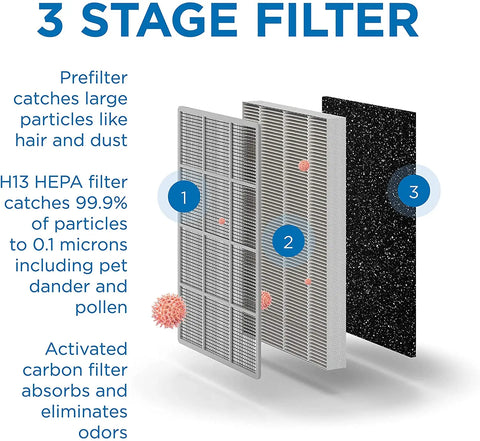No Products in the Cart

The season of allergy is knocking at our doors, and we know that you are looking for a solution to this exhausting problem. One must keep in mind that the allergies aren't just caused by air pollution from car exhaust or factory smoke. But also dust mites, mold spores, pollen, and pet dander. All of these can easily be found inside your home premises and can be a massive contributor to severe allergies and other health problems if your family has pre-existing allergies or respiratory problems like Asthma. But the good news is that mold, spores, and other airborne contaminants can be eradicated using an air purifier. As the name implies, Air Purifiers are designed to remove allergens from a room by trapping them and pushing filtered, cleaner air back into it. This device might be just what you also need to improve your home's indoor air quality all year round.
Who needs an air purifier?
Who needs an air purifier, and why is there a need for air purifiers? Particulate matter, also known as particulates, are tiny particles of solids and liquid droplets that float in the air inside our homes. Dust, for instance, consists of fine particles, while pet dander is made up of coarser particles.
By trapping these airborne particles in a filter, air purifiers are able to remove the airborne allergens that can contribute to allergies by inhaling them. So, you won't have to miss any more fun parties due to your allergies.
Also, when the season of allergies is just around the corner, the birds are on the move, the flowers are changing colors, and the temperature of the breeze is changing. It is also that time of the year when the winds blow a lot of pollen from trees and flowers. Not only do rains help with plant growth, but it also gives space for molds. Unfortunately, these airborne particles make allergy sufferers sick.
Especially during allergy season, an air purifier is a worthwhile investment.
Air purifiers: what you need to know
The only purpose of an air purifier is to purify the air around it. The machine has a fan that gathers air, which flows through a special filter system to capture microscopic particles. The fewer of these harmful particles in the air, the less likely you are to breathe them into your lungs. With an air purifier, the lungs don't have to be the only filter for particles that make people sick. A suitable quality device can trap up to 99% of all air pollutants that would otherwise enter your airways.
Remember that an air purifier is different from an air quality monitor. The former can remove pollutants from the air, while even the best indoor air quality monitor cannot. The latter now only recognizes the types of pollutants in the room air and reports the content of some substances. This device is an excellent tool for identifying the source of many pollutants in the air as well as separating different kinds of pollutants.
Also noteworthy is that air purifiers are not a panacea for removing all impurities from indoor air. However, HVAC service providers recommend combining the device with a high-quality filter for your HVAC system to reduce the concentration of indoor air pollution further.
Why an air purifier is worth it
Your home can benefit from an air purifier's many benefits. Here are some of them:
Mold spores from outside can enter your living space and expose all residents to these airborne contaminants. Moisture issues won't help either, as humid and humid environments feed mold and mildew. A special air purifier is available on the market that will fight mold and bacteria and ensure your family's health while you are indoors.
Best Air Purifier for Allergy Season
Modern air purifiers are available in various types, each using a specific type of air filter technology. For an allergen-free interior to relax this spring, heating, and air conditioning repair companies recommend the True HEPA / UVC air purifier. It is typically priced high but worth the investment, especially for homeowners who live in areas with high allergen levels or experience respiratory problems when their allergies are in full swing.
A high-efficiency air purifier combines a HEPA filter with ultraviolet (UV) light, retaining allergens, germs, and odor-causing bacteria. HEPA, the gold standard for air purification, is also used in some HVAC systems. Because it is a True HEPA filter, it is certified to remove 99.97% of all microscopic particles that are 0.3 microns or smaller.
A purifier with True HEPA filters works just as well. Those with severe allergies may benefit from it, as it can provide some protection to anyone living in your home. This appliance can help keep your home fresh by removing dust mites, pollen, mold spores, and other particles that can cause seasonal allergies. In order to maintain optimum performance, air filters are changed every three months.

Additional Considerations for Choosing an Air Purifier
It is wise to consider some key factors when buying an air purifier for your home, including the following: